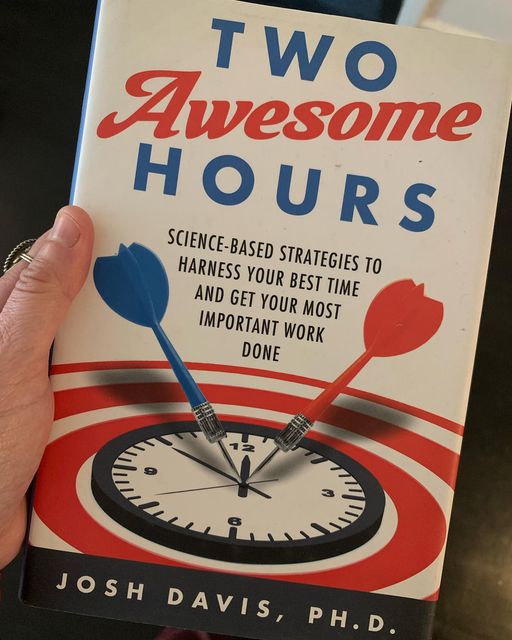In "Two Awesome Hours," Josh Davis argues that focusing on optimizing your two most productive hours each day is more effective than striving for constant productivity. He provides science-based strategies to help you identify your peak performance times, manage your mental energy, and create an environment that promotes focused work.
Lessons from "Two Awesome Hours" by Josh Davis:
1. Recognize Your Decision Points: Identify the moments throughout your day when you have the opportunity to choose how you spend your time. These decision points occur when tasks end or are interrupted, and they offer you a chance to prioritize and focus on what truly matters.
2. Manage Your Mental Energy: Schedule tasks based on their "processing demand" and recovery time. Cognitive tasks requiring intense focus and self-control can be emotionally draining and mentally demanding. Interweave them with simpler tasks to allow your mind to rest and recharge.
3. Learn to Direct Your Attention: Don't fight distractions, instead, learn to manage them. Understand that your attention systems are designed to wander, and occasionally letting your mind wander can actually lead to creative solutions. Schedule time for focused work, followed by "buffer" activities that are mildly demanding but don't require intense concentration.
4. Fuel Your Body and Mind: What you eat and drink significantly impacts your energy levels and focus. Choose foods that provide sustained energy and avoid sugary snacks that can lead to crashes. Prioritize sleep and regular exercise for optimal cognitive performance.
5. Optimize Your Workspace: Design your workspace to minimize distractions and promote focus. Eliminate clutter, adjust lighting and temperature, and choose a location that suits your preferred work style. Experiment and find what works best for you.
6. Embrace the Power of Rituals: Establish routines for starting and ending your work time. These rituals can signal to your brain that it's time to focus or relax, aiding your transition between tasks and promoting mental clarity.
7. Identify and Eliminate Time Wasters: Analyze your daily activities and identify tasks that consume your time but provide little value. Eliminate or delegate these tasks to free up time for more meaningful and impactful activities.
8. Learn to Say No: Don't be afraid to say no to requests that would overload your schedule or detract from your priorities. Protect your time fiercely and delegate or decline tasks that don't align with your goals and values.
9. Celebrate Your Wins: Acknowledge and celebrate your achievements, no matter how small. This positive reinforcement will motivate you to continue striving for your goals and maintain your focus on what matters most.
10. Track and Reflect: Regularly track your time to gain insights into your actual spending habits. Identify areas for improvement and adjust your schedule accordingly. Reflect on your progress and celebrate your successes to maintain a positive and motivated mindset.
By incorporating these lessons from "Two Awesome Hours," you can learn to manage your time effectively, prioritize your tasks, and optimize your mental energy to achieve peak productivity and create "two awesome hours" of focused work each day. Remember, time is your most valuable resource, and learning to harness it effectively is the key to achieving your goals and living a fulfilling life.




